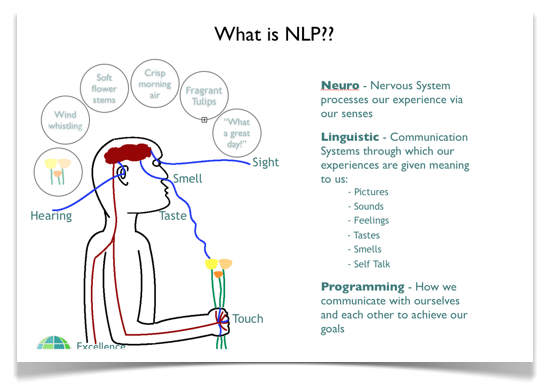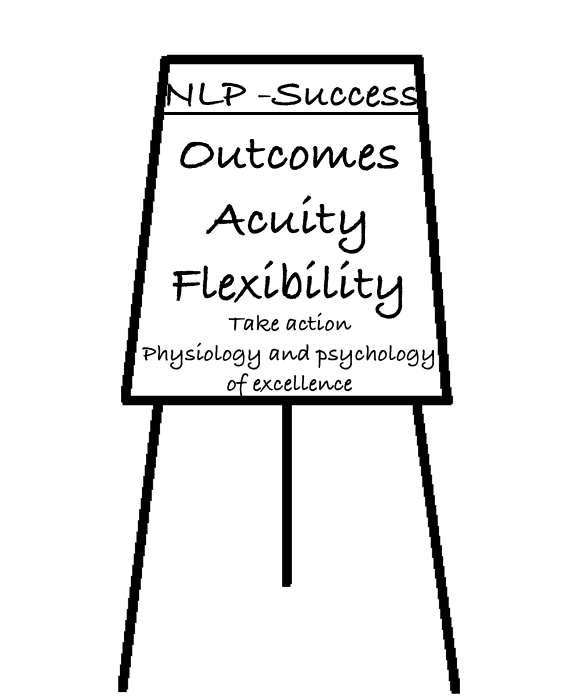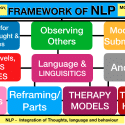NLP helps people change the way that they think, behave and communicate with themselves and with others to overcome problems and reach out for excellence. So what is it?
In Short:
NLP is a study of behavioural and cognitive excellence.
The N in NLP stands for Neuro – how we use our brain and body to produce our life results.
L in NLP stands for Linguistic – how we code information from the world around us and internal thoughts so that we can make sense of them. How we communicate our thoughts to others.
P in NLP stands for Programming – How our brain and body reacts to various internal thoughts and external information to produce repetitive behaviour, habits and thinking.
Many have called NLP the User Manual to the Brain. How to use your brain on purpose to get better results and get life the way that we want it.
NLP will help you to create (& recreate) your life the way that you want it.
NLP gives you a process to achieve your desired outcomes. NLP provides an understanding of how people think & act and so enables you to influence others
How would you like to be able to:
- control your own state of mind?
- realise your own potential?
- achieve your desired goals and outcomes?
Do you think that your life would be enhanced by being able to understand:
- what motivates people?
- how to motivate people by your use of language and how you act?
- how what you say and do influences others in a positive and negative way?
That is what NLP enables you to do
What is NLP – exactly?
Co-created by Richard Bandler and John Grinder in the 1970s, NLP is now widely used in business, coaching, therapy and education. Bandler and Grinder originally intended it to be a way of learning any skill from anyone, the basis being, “If you can do it, then I can do it too. As long as I can find out how you do it. Then I can model you.”
Some have called it “making the how possible.” This relates to The modelling methodology in NLP
Essentially it is:
- A study of behavioural excellence.
- How we think and use our minds (Neuro), in conjunction with the language that we use (Linguistic), and actions that we take (Programming) in order to achieve our desired outcomes.
Here are how some of our students of NLP describe it when asked “What is NLP?“:
- Without boring people with jargon. I would simply say that nlp is the study of excellence and how to replicate it. Through proven techniques and methodology it can help assist you to obtain your desired results in all areas of your life.
- NLP is an easy process of making positive changes through relaxation and communication with the subconcious mind (the part of the brain which is readily available to take positive instructions for great changes). NLP also works by encouraging and motivating a positive approach to thinking through changing the way you speak. People have descibed it to be so powerful that it created such magnificent results which affected their day to day life and future goals in postive ways.
Life is a great process of routine and learnings. Our mind works so fast and has no choice but lead to generalisation of experiences and everything we do or see or hear daily. NLP helps you master your own mind to maximize your experiences and feel confident inside as well as outside.
NLP stands for Neuro Linguistic Programmimg. Neuro = Brain, Linguistic = language and how we communicate, Programming = pre determined patterns and processes. So it is about the brain, how we communicate and the language we use and how this influences our b
ehaviours, patterns and thing we do and feel. NLP is a set of tools, techniques, models and understanding that helps us to understand people, and them to understand themselves and can help them to change their patterns and thinking that can help them be more resourceful.
It’s a study of excellence and how to replicate it. It’s based on Neuro – what the senses pick up, Linguistic – how your self talk defines and records those experiences, and Programming – how that same information is used to communicate with yourself and the outside world. It’s an Attitude and a methodology that leaves behind a trail of techniques. An attitude being an attitude of curiosity as to how a behaviour is occurring and can be altered. Methodology being a system of denominalising a concept and modelling a process like, rapport for example was once a concept, but through modelling, a process found the component parts and rapport became a process that anybody can learn.
NLP is the study of excellence, and uses methodology and techniques to understand and improve desired communication and behaviour.
What is NLP? It is a personal growth approach that helps us to discover how to use our brain to run our lives’ successfully. This is done by targeting the 3 components that are responsible for producing human experience – our nervous system (how we process the information that we take in), Linguistic (how we express the images in our head) and finally Programming (our interpretation of what we have experienced)
I think that there are many definitions to describe NLP as it means different things to different people, but I like to describe NLP as the psychology of change and modelling excellence, it can assist with personal development and help with the development of others as it aids amongst other things rapport and effective communication.
Neuro Linguistic Programming is a conscious understanding of how the mind unconsciously interprets the world outside and how this can be influenced to encourage behaviours that can positively affect the quality of life.
NLP is a set of models, skills and techniques one can use to achieve specific and desired outcomes. With the use of the language of the mind we increase our choices and enhances the quality of our lives. By not assuming but rather being curious and fascinated with the world around us we allow ourselves to learn new things and grow. Last but not least, NLP is not some theory “system”, but is practical and is used throughout the world in business, law, education, sport and so on.
It may be an idea to refer back to a short conversation I heard, told by a student about their conversation with a cousin.
When I first told him about this course (NLP Master Practitioner) and its content, he said ‘I want you to make me smart.’ I laughed and said ‘You’re already very smart, you just don’t want to show it, otherwise you’d be dangerous.’
Now had he asked me ‘By the way, what is NLP?’
I said, “First of all NLP stands for Neuro- Linguistic Programming. It’s a method used for changing behaviour. You know how you want to be smart, would you say ‘smart’ is just a concept in your mind – like just an idea? (I know him, he’d say “Yes”). Now let’s think of smart as action or behavior rather than a concept. So let’s say ‘smart is what smart people do’.
What NLP does is take the concept of smart and study people who are smart and who do smart things to achieve what they want. So NLP breaks down what it takes to be smart like that. People who practice NLP have curious minds and they explore by asking questions like: What do these people do, and how do they do them?, How do the carry themselves?, How do they look at things?, How do they relate to other people?, What are their beliefs about themselves and the world around them?, and many more questions like that. You figure out the neurology of the smart people. Once those questions are answered and you know what it takes to be smart, then you can install that process in yourself to program your mind and your behavior will adapt to this new program. And the good news is you can then start doing all those things that smart people do. In short, it’s all about modeling the desired behaviour. So if you’re serious about getting smart or smarter, start getting curious and start observing those people you consider smart and see what it is that makes them smart and see how you can model their behaviour. ”
Thinking back now…..
Remember when you were a child and the world seemed such a fun and exciting place. You had no worries about not having enough time, money, milk in the fridge, ink in your pen….. You would not get irritated or angry at someone jumping in the queue in front of you, or leaving their fog lights on in bright sunshine, or angry at yourself for forgetting to do something or repeatedly stubbing your toe! You felt no guilt in asking for more, or not brushing your teeth before you went to bed. In fact that may have added to the excitement!
What went wrong???
Life happened, that’s all.
Whenever something happens to us or around us we take in the event through our senses of sight, sound, touch, taste and smell.
Our brain then processes the information and here is the first problem. We receive about 2,000,000 bits of information per second through our senses and our brain can only cope with about 7 of those bits. So in order to complete the processing of the information our brain filters the information down to seven bits. Obviously this means that 1,999,993 bits must be deleted. This is why two people experiencing the same event may have completely different recollections of it.
What we are left with is our memory of the event. This memory is accessible to us in our mind by recalling pictures, sounds, feelings, tastes and smells.
If you enjoyed the event and you have good memories of it then it will make you feel good and generate positive behaviour in you, if your mind interprets it as bad then you will generally feel negative and behave accordingly. What stops you from putting your hand in a fire? It is not that someone told you not to, it is because the thought of doing it brings up thoughts of pain, being burnt is unpleasant, you know that through experience and so you do not do it.
As children we had no previous experience of life to give us good or bad memories, and so we were just oblivious, excited by new events.
We take events in through our senses, process the thoughts, create memories, and the thoughts we are left with determine what actions we take, positive or negative.
Given that our actions determine our results in life, wouldn’t it be useful to be in control of this process? NLP puts you in control!
We each have one or two preferred senses that we use to take in and recall events. So, some of us may store most of our memories in picture format, some in sounds, and some in feelings. We all use all of our senses but we prefer to use some of our senses more than others.
Which of the following statements would be your preference?
I make decisions based on….
…what looks best to me.
…which way sounds the best.
…gut level feelings.
If the first statement seemed most appropriate then this has appealed to your visual sense. If the second sounded best then this is appealing to your auditory sense, and if the third felt good then that would suit feelers or your Kinaesthetic sense.
You can influence your own actions and the actions of others by understanding how to communicate in that person’s preferred way. NLP gives you that understanding!
I want to know more about NLP and how it can benefit me
Please read on….
We have the following accredited NLP Training Courses:
- NLP Practitioner Training Course
- NLP Master Practitioner Training Course
- NLP Trainer Training
- NLP Master Trainer program
We would be pleased to discuss your requirements and can provide you with a way forward to specifically suit your circumstances. Please feel free to call us on 0114 236 0047 to discuss how NLP can help you to get the personal or business outcomes that you require.
NLP is a profession and a career (Practicing NLP professionally)
NLP professionals practice NLP themselves are qualified to help others using the methodology and skills within Neuro-Linguistic Programming.
There are four levels of professional NLP practice
- NLP Practitioner
- NLP Master Practitioner
- NLP Trainer
- NLP Master Trainer
NLP Practitioners and NLP Master Practitioners work with the general public in an environment much like to that of Life and Business coaching. They are help people in all aspects of life and business to set objectives for life that get them closer to where they want to be,to overcome mental obstacles to success and happiness and to design a plan for actions, habits, learning and skills that will set them up for success.
NLP Trainers train and accredit NLP Practitioners and NLP Master Practitioners.
NLP Master Trainers train and accredit NLP Trainers in addition to training and accrediting NLP Practitioners and NLP Master Practitioners.



